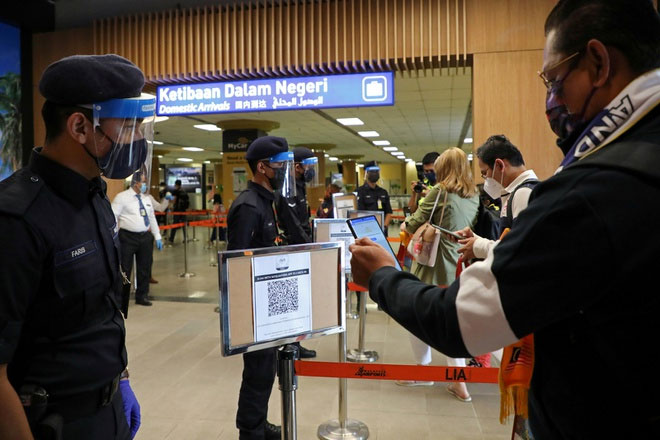The Malaysian Ministry of Health has reported the discovery of the first two cases of AY.4.2, a sublineage of the Delta variant, also known as Delta Plus, linked to international students returning from the UK.
In a statement on November 6, Noor Hisham Abdullah, Director-General of the Malaysian Ministry of Health, noted that these cases were identified when the patients arrived at Kuala Lumpur International Airport (KLIA) on October 2, according to Star.
After undergoing RT-PCR testing, both individuals initially tested negative. However, during their quarantine, they tested positive on a second test conducted on October 7.

A traveler scans a QR code to check in upon arriving at the airport in Langkawi on September 16, after the location reopened to domestic tourists. (Photo: Reuters).
“The sample has been fully sequenced at the Institute of Molecular Medicine, Universiti Kebangsaan Malaysia (UBMI-UKM). The results were announced on October 30,” said Noor Hisham.
Known as Delta Plus, the AY.4.2 variant is one of 75 sublineages derived from the Delta strain, according to Noor Hisham.
“This variant has two additional mutations in the spike protein (the mechanism by which the virus attaches to human cells), specifically Y145H and A222V. By the end of October, the AY.4.2 variant accounted for 10% of the sequenced cases in the UK,” he added.
The director-general also mentioned that the UK Health Security Agency classified the AY.4.2 variant as a variant under investigation on October 20.
“Current vaccines remain effective against this variant, and measures such as quarantine and testing can help reduce the risk of this variant spreading in Malaysia, especially at the country’s international gateways,” Noor Hisham stated, adding that the Malaysian Ministry of Health will closely monitor this variant in the community.
The World Health Organization (WHO) has indicated that AY.4.2 has been reported in over 40 countries and territories. Delta Plus has not yet been classified by the WHO as a variant of interest (VOI) or a variant of concern (VOC), and therefore does not have a designated name in the Greek alphabet.
So far, there is no evidence that this variant is more dangerous than previously identified variants, nor is there any indication of reduced vaccine effectiveness against Covid-19, as reported by the UK Health Security Agency on October 22.


















































